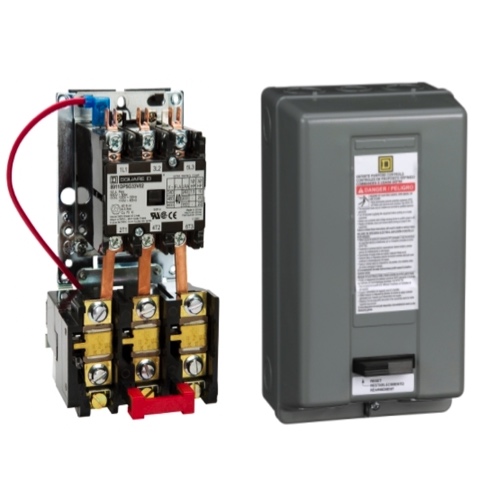Definite Purpose Starters

Definite purpose starters are motor control devices specifically engineered for HVAC, air conditioning, heating, and ventilation systems. These starters are available with starter coil voltages ranging from 24 VAC up to 600 VAC and current ratings of 20 amps up to 50 amps, making them suitable for a wide range of commercial and light industrial motor applications. Their application-specific design supports repeated motor start and stop cycles while minimizing electrical stress on motors and upstream power distribution components.
Each definite purpose starter combines a definite purpose contactor with an overload relay into a complete motor control solution. This integrated design provides reliable switching and protection against sustained overcurrent conditions that can damage motors. Many models include a metal mounting plate to simplify installation and maintain mechanical stability in high-demand electrical environments.
Available in both open and totally enclosed configurations, definite purpose starters are well-suited for use in ventilation systems, air handling units, refrigeration equipment, and heating applications. With high coil efficiency, precise pole configurations, and defined voltage and amperage ratings, these starters support long-term reliability, optimized energy usage, and consistent motor performance in HVAC and industrial systems.
FAQs
Q: What is a definite purpose starter?
A definite purpose starter is a complete motor control device that includes a contactor and overload relay designed for specific applications such as HVAC and refrigeration systems.
Q: How does a definite purpose starter differ from a contactor?
A contactor is a switching device only, while a definite purpose starter includes both a contactor and overload protection for motor safety.
Q: Where are definite purpose starters commonly used?
They are widely used in HVAC equipment, air conditioning units, ventilation systems, refrigeration, and heating applications.
Q: What enclosure types are available for definite purpose starters?
Definite purpose starters are available in open and totally enclosed configurations to suit different environmental and installation requirements.
Q: Do definite purpose starters help improve energy efficiency?
Yes, by providing controlled motor operation and protection, they help optimize energy usage and reduce unnecessary electrical stress.
Why Buy Definite Purpose Starters from RSP Supply
RSP Supply offers a full selection of definite purpose starters designed for reliable motor control in HVAC and industrial applications. Our starters combine durable contactors, effective overload protection, and application-specific designs to support long-term performance. Customers rely on RSP Supply for trusted motor control solutions, technical expertise, and components built to meet the demands of modern heating, cooling, and ventilation systems.

